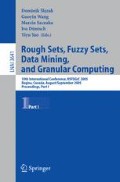Abstract
[4] placed an approximation space (U,≡ ) in a type-lowering retraction with its power set 2U such that the ≡ -exact subsets of U comprise the kernel of the retraction, where ≡ is the equivalence relation of set-theoretic indiscernibility within the resulting universe of exact sets. Since a concept thus forms a set just in case it is ≡ -exact, set-theoretic comprehension in (U,≡ ) is governed by the method of upper and lower approximations of Rough Set Theory. Some central features of this universe were informally axiomatized in [3] in terms of the notion of a Proximal Frege Structure and its associated modal Boolean algebra of exact sets. The present essay generalizes the axiomatic notion of a PFS to tolerance (reflexive, symmetric) relations, where the universe of exact sets forms a modal ortho-lattice. An example of this general notion is provided by the tolerance relation of “matching” over U.
Access this chapter
Tax calculation will be finalised at checkout
Purchases are for personal use only
Preview
Unable to display preview. Download preview PDF.
References
Aczel, P.: Frege Structure and the Notions of Proposition, Truth and Set. In: Barwise, J., Keisler, H., Kunen, K. (eds.) The Kleene Symposium, pp. 31–59. North-Holland, Amsterdam (1980)
Apostoli, P., Kanda, A., Polkowski, L.: First Steps Towards Computably Infinite Information Systems. In: Dubois, D., Grzymala-Busse, J., Inuiguchi, M., Polkowski, L. (eds.) Rough Sets and Fuzzy Sets. Transactions in Rough Sets. LNCS, vol. 2, pp. 161–198. Springer, Heidelberg (2004)
Apostoli, P., Kanda, A.: Approximation Spaces of Type-Free Sets. In: Ziarko, W.P., Yao, Y. (eds.) RSCTC 2000. LNCS (LNAI), vol. 2005, pp. 98–105. Springer, Heidelberg (2001)
Apostoli, P., Kanda, A.: Parts of the Continuum: towards a modern ontology of science. Forthcoming. In: Nowak, L. (ed.) Poznan Studies in the Philosophy of Science and the Humanities (2005)
Bell, J.L., Machover, M.: A Course in Mathematical Logic. North Holland, Amsterdam (1977)
Bell, J.L.: Orthologic, Forcing and the Manifestation of Attributes. In: Proc. of the Southeast Asian Conference on Logic. Studies in Logic, vol. III. North Holland, Amsterdam (1983)
Bell, J.L.: A new Approach to Quantum Logic. Brit. J. Phil. Sci. 37, 83–99 (1986)
Bell, J.L.: Set and Classes as Many. J. of Philosophical Logic 29(6), 595–681 (2000)
Birkhoff, G.: Lattice Theory, 3rd edn., vol. XXV. Amer. Math. Colloq. Publs (1960)
Blamey, S.: Partial Logic. In: Gabbay, D., Guenthner, F. (eds.) Handbook of Philosophical Logic, vol. III, pp. 1–70. D. Reidel Publishing Company (1986)
Cattaneo, G.: Abstract Approximation Spaces for Rough Theories. In: Polkowski, L., Skowron, A. (eds.) Rough Sets in Knowledge Discovery: Methodology and Applications. Springer, Heidelberg (1998)
Chellas, B.F.: An Introduction to Modal Logic. Cambridge University Press, Cambridge (1980)
Feferman, S.: Towards Useful Type-free Theories I. Journal of Symbolic Logic 49, 75–111 (1984)
Fine, K.: First-Order Modal Theories. I-Sets. Nous 15, 177–205 (1981)
Frege, G.: Die Grundlagen der Arithmetik. Eine logisch mathematische Untersachung uber den Begridd der Zahl. Breslau, William Koebner. English translation by J. L. Austin, The Foundations of Arihmetic. Oxford, Basil Blackwell (1950)
Frege, G.: Grundgesetze der Arithmetik. Vols. 1, 2. Jena, Verlag Hermann Pohle. Reprinted at Hildesheim. Vol. 1 is partially translated in [17]. Vol. 2 is translated in part in [18] (1893, 1903)
Frege, G.: Translations from the Philosophical Writings of Gottlob Frege. Edited and translated by Peter Geach and Max Black. Oxford, Basil Blackwell (1960)
Furth, M.: The Basic Laws of Arithmetic: Expositition of the system. University of California Press, Berkeley (1964)
Gilmore, P.C.: Natural Deduction Based Set Theories: A New Resolution of the Old Paradoxes. J. of Symbolic Logic 51, 394–411 (1986)
Kock, A.: Synthetic Differential Geometry. In: London Math. Soc. Lecture Notes, vol. 51. Cambridge University Press, Cambridge (1981)
Kripke, S.: Semantical Analysis of Modal Logic I. Normal Modal Propositional Calculi. Zeitschrift f. Math. Logik und Grundlagen d. Math., 9 (1963)
Lewis, D.: Counterpart Theory and Quantified Modal Logic. J. of Philosophy 65, 113–126 (1968); Reprinted in Michael J. Loux (ed), The Possible and the Actual. Cornell, U.P. (1979)
Orlowska, E.: Semantics of Vague Concepts. In: Dorn, G., Weingartner, P. (eds.) Foundations of Logic and Linguistics, Problems and Their Solutions. Plenum Press, NewYork (1985)
Parsons, C.: What is the iterative conception of set? In: Butts, R.E., Hintikka, J. (eds.) Logic, Foundation of Mathematics, and Computability Theory, pp. 335–367. D. Reidel, Dordrechtz (1977); Reprinted in P. Benacerraf, P., Putnam, H. (eds.), Philosophy of Mathematics: Selected Readings. 2nd ed. Cambridge University Press. (1983) 503-529. Also reprinted in Mathematics in Philosophy, Selected Essays, Cornell University Press.
Parsons, C.: Modal Set Theories. Journal of Symbolic Logic 46, 683–684 (1981)
Pawlak, Z.: Rough Sets, Algebraic and Topological Approaches. International Journal of Computer and Information Sciences 11, 341–356 (1982)
Plotkin, G.: A Power Domain Construction. SIAM Journal on Computing 5, 452–487 (1976)
Scott, D.: Continuous lattices. Lecture Notes in Math., vol. 274, pp. 97–136. Springer, Berlin (1971)
Scott, D.: Data Types as Lattices. SIAM Journal on Computing 5, 522–587 (1976)
Skowron, A., Stepaniuk, J.: Generalized Approximation Spaces. In: Proc. 3rd Int. Workshop on Rough Sets and Soft Computing, San Jose, USA, November 10-12 (1994)
Skowron, A., Stepaniuk, J.: Tolerance Approximation Spaces. Fundementa Informaticae 27, 245–253 (1996)
Smyth, M.: Power Domains. Journal of Computer and Systems Science 16, 23–36 (1978)
Smyth, M., Plotkin, G.: The Categorical Solutions of Recursive Domain Equations. In: Proc. of the 18th FOCS Conference (1977)
Yao, Y.Y.: On Generalizing Pawlak Approximation Operators. In: Polkowski, L., Skowron, A. (eds.) CSL 1997. LNCS, vol. 1414, pp. 289–307. Springer, Heidelberg (1998)
Author information
Authors and Affiliations
Editor information
Editors and Affiliations
Rights and permissions
Copyright information
© 2005 Springer-Verlag Berlin Heidelberg
About this paper
Cite this paper
Apostoli, P.J., Kanda, A. (2005). Proximity Spaces of Exact Sets. In: Ślęzak, D., Wang, G., Szczuka, M., Düntsch, I., Yao, Y. (eds) Rough Sets, Fuzzy Sets, Data Mining, and Granular Computing. RSFDGrC 2005. Lecture Notes in Computer Science(), vol 3641. Springer, Berlin, Heidelberg. https://doi.org/10.1007/11548669_10
Download citation
DOI: https://doi.org/10.1007/11548669_10
Publisher Name: Springer, Berlin, Heidelberg
Print ISBN: 978-3-540-28653-0
Online ISBN: 978-3-540-31825-5
eBook Packages: Computer ScienceComputer Science (R0)

